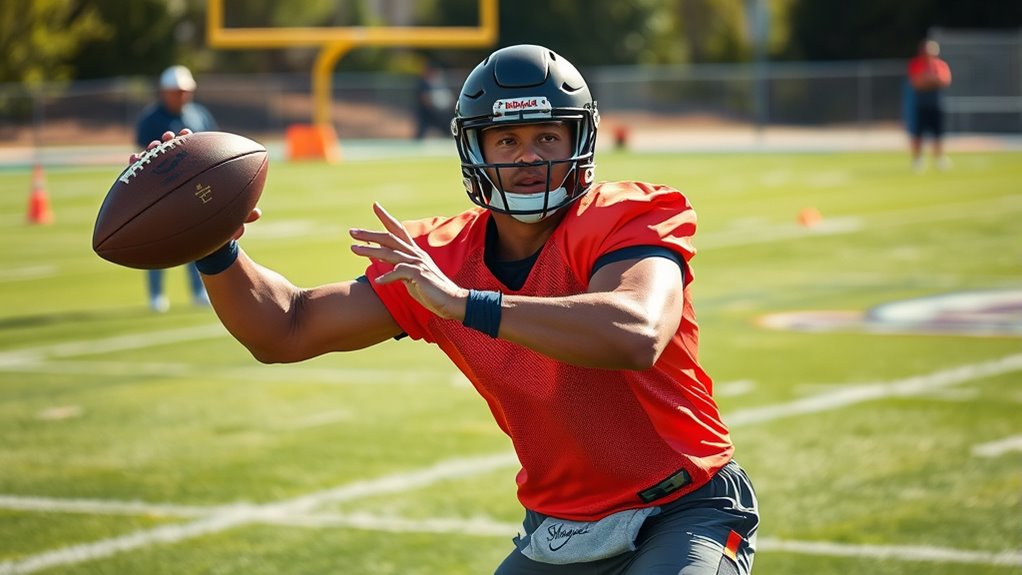To train like a pro, you need to embrace deliberate practice, which means focusing intentionally on specific skills and pushing beyond your comfort zone. Actively analyze your performance, seek expert feedback, and make precise adjustments. This method emphasizes quality over quantity, ensuring every effort moves you closer to mastery. By consistently applying these focused techniques, you’ll develop faster and more effectively—if you want to access the full potential of deliberate practice, keep exploring how to refine your approach.
Key Takeaways
- Engage in focused, goal-specific practice that pushes beyond comfort zones to target weaknesses.
- Incorporate regular expert feedback to identify errors and refine techniques effectively.
- Prioritize quality over quantity by deliberately analyzing performance and making targeted adjustments.
- Use a feedback loop to align practice efforts with skill development goals and track progress.
- Systematically review and adapt your practice strategies to ensure continuous and efficient mastery.

Deliberate practice is a focused and intentional approach to improving your skills, often distinguished from simply repeating tasks mindlessly. It involves pushing yourself beyond your comfort zone, targeting specific weaknesses, and actively seeking ways to improve. Unlike passive repetition, deliberate practice requires you to analyze your performance critically and identify areas where you can grow. This process is most effective when you incorporate expert feedback, which helps you understand whether you’re on the right track or need to adjust your methods. When you engage in focused repetition, you’re not just doing the same thing over and over; instead, you’re honing in on particular aspects that need refinement, making every effort count toward mastery.
Expert feedback plays a pivotal role in deliberate practice because it provides an outside perspective that you might overlook. Whether it’s a coach, mentor, or seasoned peer, their insights help you recognize subtle errors and guide you toward better techniques. Without this feedback, you risk reinforcing bad habits or missing opportunities for improvement. When you actively seek out and listen to expert critiques, you gain clarity about what to focus on next, speeding up your progress. This feedback loop ensures your practice sessions are productive and aligned with your goals, making your efforts more efficient. Additionally, understanding skill development techniques can further enhance your ability to improve systematically.
Frequently Asked Questions
How Long Should I Practice Each Day for Optimal Results?
For ideal results, aim for about 1 to 2 hours of deliberate practice daily. Your practice duration should be tailored to your skill level and goals, ensuring you stay focused without burnout. Incorporate daily scheduling that includes focused sessions with specific targets. Consistency matters more than length, so make it a habit to practice regularly, gradually increasing intensity to challenge yourself and accelerate your progress.
Can Deliberate Practice Be Effective Without a Coach or Mentor?
You can succeed with deliberate practice without a coach by focusing on self-directed learning and seeking peer feedback. For example, a guitarist improves by recording themselves, analyzing their performance, and sharing it with friends for constructive criticism. This way, you identify weaknesses, set specific goals, and stay motivated. Peer feedback provides valuable insights, helping you refine skills efficiently even without a mentor guiding your progress.
What Are Common Mistakes to Avoid During Deliberate Practice?
You should avoid mindless repetition and neglecting feedback during deliberate practice. Repeating tasks without focus can reinforce bad habits, while ignoring feedback prevents improvement. Stay attentive and intentionally challenge yourself with specific goals. Seek constructive criticism, adjust your approach, and reflect on your progress. This active engagement helps you learn faster and develop skills more effectively, ensuring your practice remains purposeful and productive.
How Do I Measure Progress During Deliberate Practice?
You measure progress during deliberate practice by tracking performance metrics and skill benchmarks. Regularly review your results to see improvements in accuracy, speed, or consistency. Set specific goals and compare your current performance against those benchmarks. Keep a practice journal to note progress and setbacks. This helps you stay motivated, adjust your training, and guarantee you’re continuously evolving toward mastery.
Is Deliberate Practice Suitable for All Skill Levels?
Yes, deliberate practice suits all skill levels, as it focuses on targeted skill acquisition and continuous improvement. You can adapt challenges to match your current abilities, ensuring steady progress. Motivation strategies like setting specific goals and tracking small wins keep you engaged. Whether you’re a beginner or advanced, deliberate practice helps you refine skills effectively by pushing boundaries and maintaining focus on areas needing growth.
Conclusion
By embracing deliberate practice, you substantially boost your skills faster—studies show top performers dedicate over 1,200 hours annually to focused training. Remember, it’s not just about working hard, but working smart with purpose. Keep pushing your limits, stay consistent, and refine your techniques. With dedication and intentional effort, you’ll see progress unfold much sooner than you think. So, commit to deliberate practice, and unleash your full potential like the pros do.









